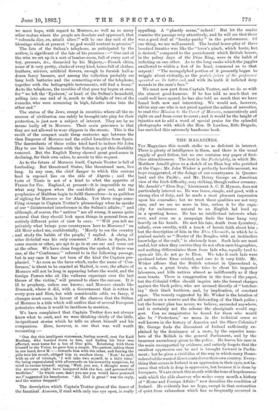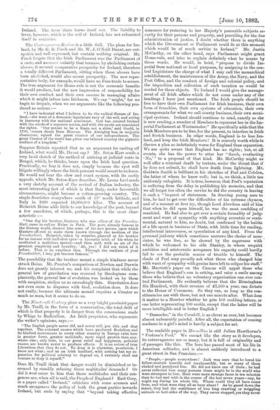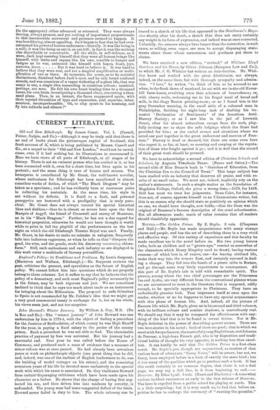THE MAGAZINES.
THE Magazines this month strike us as deficient in interest. There is plenty of intelligence in them, and there is the usual supply of good fiction, but no one contains any paper of first- class attractiveness. The best is the Fortnightly, in which Mr. Matthew Arnold gives us a sketch of an Eton boy who perished at the Cape ; Mr. John Wisker a perfectly horrible account, we hope exaggerated, of the doings of our countrymen in Queens- land and the Pacific; and Mr. Henry George an American view of the Irish difficulty, very striking, though rather scre,amy. Mr. Arnold's " Eton Boy," Lieutenant A. C. B. Mynors, does not particularly interest us. He was brave, simple, and good, with a strong idea of duty, and he made a most pleasant impression upon his comrades ; but we trust these qualities are not very rare, and we see no more in him, unless it be the capa- city for endurance natural to an English lad bred up in a sporting house. He has no intellectual interests what- ever, and even on a campaign finds the time hang very heavily on his hands. He met his fate, death from dysentery, calmly, even sweetly, with a touch of heroic faith about him ; but the description of him in the Eton Chronicle, in which he is praised mainly as "Master of the Beagles, with an instinctive knowledge of the craft," is obviously true. Such lads are most useful, but when they survive they do not often earn biographies, and nothing differentiates them from lads who, equally bred to open-air life, do not go to Eton. We take it such lads were produced before Eton existed, and owe to it very little. Mr. Wisker affirms that the British colonist in Queensland is, as a rule, a great brute, who tries to cheat his imported labourers, and kills natives almost as indifferently as if they were beasts. There is exaggeration in the tone of the paper, but the Colonial Office should inquire into the formal charges against the black police, who are accused directly of " butcher- ing " their black brethren, and, by implication, of constant rapes. The remedy suggested by Mr. Wisker is the location of all natives on a reserve and the disbanding of the black police ; but the former plan has never, we believe, succeeded anywhere, and is certainly not the scheme the aboriginals would sug- gest. Can no magistrates be found for them who would also be "Protectors," we mean in the technical sense so well known in the history of America and the Slave Colonies ? Mr. George finds the discontent of Ireland sufficiently ex- plained by the dominance of a caste, by the superior num- bers of the British in the general Parliament, and by the immense ascendency given to the police. He leaves his case in the main unsupported by evidence, and entirely forgets that the smallest oppression can be and is brought forward in Parlia- ment; but he gives a vivid idea of the way in which many Home- rulers feel the wantof direct control over their own country. Every- thing that occurs in Ireland is an oppression in their eyes, not be- cause that which is done is oppressive, but because it is done by foreigners. We are struck this month with the tone of hopelessness with which the able observer who writes every month a history of "Home and Foreign Affairs" now describes the condition of Ireland. He evidently has no hope, except in that restoration of quiet from exhaustion which has so frequently occurred in
Ireland. The fever there burns itself out. The liability to fever, however, which is the evil of Ireland, has not exhausted itself in centuries.
The Canto ',war( ry Review is a little dull. The pleas for Ire- land, by Mr. 0. B. Finch and Mr. W. J. O'Neill Daunt, are out- spoken and well ex-pressed, but contain nothing original. Mr. Finch forgets that the Irish Parliament was the Parliament of a caste, and assumes unfairly that because, by abolishing certain abuses, it secured comparative prosperity for Ireland, therefore
a totally different Parliament, sitting when these abuses have been abolished, would also secure prosperity. The new repre- sentative body, for example, would have no Free-trade to secure.
The true argument for Home-rule is not the economic benefits it would produce, but the new impression of responsibility for their own conduct and their own success in managing affairs which it might infuse into Irishmen. We say "might," for we begin to despair, when we see arguments like the following pro- duced as serious :—
"I have indicated what I believe to be the radical disease of Ire- land,—the want of a domestic legislature racy of the soil, and acting in harmony with the national sentiment. God has created Ireland with the needs of a separate nation, and with the needs are associated the rights. 'Oar patent to be a State, not a shire,' said Goold, in 1799, 'comes direct from Heaven. The Almighty has in majestic characters, signed the great charter of our independence. The great Creator of the world has given our beloved country the gigantic outlines of a kingdom.'" Suppose Britain repeated that as an argument for casting off Ireland, what would Mr. Daunt say ? Mr. Seton-Karr sends a
very lucid sketch of the method of arriving at judicial rents in Bengal, which, he thinks, bears upon the Irish land question.
Practically, we fear it does not, simply because the ryot will litigate willingly where the Irish peasant would resort to violence. He would not bear the slow and exact system, with its costly appeals, which Mr. Seton-Karr describes. Mr. Leone Levi sends a very sketchy account of the revival of Italian industry, the most interesting fact of which is that Italy, under favourable circumstances, might become a cotton-growing country. The staple flourishes everywhere south of 43° north latitude, and Italy in 1880 exported 18,000,000 kilos. The account of Heinrich Heine adds little to our knowledge of the poet, beyond a few anecdotes, of which, perhaps, this is the most char- acteristic :-
"One day his brother, Gustave, who was editor of the Fremden- blatt, came to call on Heine in Paris. The poet, already famous in the literary world, showed him some of his new poems, upon which Gustave offtred to make them known through the medium of the Fremdenblatt. Heinrich, taken by surprise, glanced at his brother for'an instant with half-shut eyes—a favourite trick of his when he meditated a malicious speech—and then said, with an air of the greatest simplicity and humility, Ah, yes ! I did not think of it before. That is an excellent idea. Through the medium of your Frezndenblatt, I may yet become famous.'"
The possibility that the brother meant a simple kindness never struck Heine. Mr. Proctor's comparison of Newton and Darwin does not greatly interest us, and his complaint that while the general law of gravitation was received by theologians com- placently, the general law of evolution was looked on by them with suspicion, strikes us as exceedingly thin. Gravitation does not even seem to dispense with God, evolution does. It does not really, because the ultimate monad requires a Creator as much as man, but it seems to do so.
The Nineteenth Century gives us a very bright pessimist paper by Mr. Traill, in the form of a conversation, the total drift of which is that property is in danger from the concessions made
by Whigs to Radicalism. An Irish proprietor, who represents the writer's opinions, says
The English people never did, and never will, put this and that together. The external causes Which have produced Socialism and its kindred movements in every other country in Europe exist here in greater force, greater multitude, more rapid growth than any- where else ; only here, to our great relief and happiness, political causes are known never to produce effects. It is an axiom of true Liberalism that they do not. To deny it is alarmism, pessimism, I know not.what ; and as an Irish landlord, with nothing but my re- putation for political sobriety to depend on, I certainly shall zrot venture to deny it myself."
Does Mr. Trail think that danger would be diminished or in- creased by steadily refusing those maltitudes' demands ? Or did it ever occur to him that those multitudes and their con- geners are, when all is said, the People of England ? Earl Grey, in a paper called "Ireland," criticises with some acumen and much savageness the• policy of both the great parties towards Ireland, but ends by saying that "beyond taking effective measures for restoring to her Majesty's peaceable subjects se- curity for their persons and property, and providing for the due administration of justice, I doubt whether there is anything which the Government or Parliament could do at this moment which would be of much service to Ireland," Mr. Justin McCarthy, on the other hand, says Parliament might grant Home-rule, and tries to explain definitely what he means by those words. He would, in brief, "propose to divide Im- perial from national or local purposes, by assigning to the cen-
tral Legislature the charge of what I may call the monarchical establishment, the maintenance of the Army, the Navy, and the
Post Office, and the conduct of foreign. and colonial policy, and the imposition and collection of such taxation as would be needed for these objects. To Ireland I would give the manage- ment of all Irish affairs which do not come under any of the headings I have just mentioned. The Irish people should be free to have their own Parliament for Irish business, their own form of franchise, their own systems of education, their own arrangements for what we call county business, their own muni- cipal systems. Ireland should continue to send, exactly as she is now sending, a number of Members to represent her in the Im- perial Parliament at Westminster." He specifically adds that the Irish Members are to be free, for the present, to interfere in Irish and Scotch business. In other words, England is- to lose Ire- land, and keep the Irish Members ! It is scarcely worth while to discuss a plan so indefinitely worse for England than separation.
We are quite aware that England has no rights ; but, at all events, she has the power to utter her "dumb, everlasting No,' " to a proposal of that kind. Mr. McCarthy might as well offer a criminal death by torture, under the threat that if he does not submit, he shall have death from lightning. Mr.
Goldwin Smith is brilliant in his sketches of Peel and Cobden, the latter of whom he knew well; but is, we think, a little too uniformly eulogistic. It is true, however, that Peel's reputation is suffering from the delay in publishing his memoirs, and that we all forget too often the service he did the country in leaving it such a "bequest of statesmen. In drawing young men to him, he had to get over the difficulties of his extreme shyness, and of a manner at first icy, though Lord Aberdeen said of him that when he did open himself, he was the most confiding of mankind. He had also to get over a certain formality of judg- ment and want of sympathy with anything eccentric or senti- mental, natural to him, no doubt, but confirmed by the habits of a life spent in business of State, with little time for reading, intellectual intercourse, or speculation of any kind. From the personal jealousy which sometimes narrows the choice of asso- ciates, he was free, as he showed by the eagerness with which he welcomed to his side Stanley, in whose unquiet
ambition and aristocratic arrogance his sagacity could hardly fail to see the probable source of trouble to himself. The
shade of Peel may proudly ask what those who charged him with want of sympathy with genius have left to eclipse his staff." Mr. Marriott's paper on the Caucus will appal those who believe that England's sun is setting, and raise a smile among those who believe that no voluntary organisation can ever con- trol Parliament. He evidently believes that the Birmingham Six Hundred,. with their revenue of £1,500 a year, can dictate to the House of Commons. So they can, as long as the con- stituencies are with them, but not one minute after. What does it matter to a Member whether he gets 100 scolding letters, or one letter representing 100 scolds, except that the latter will be more intelligible and in better English ?
"Damocles," in the Corn hull, is as clever as ever, but becomes almost unbearably painful. After all, the expectation of coming madness in a girl's mind is hardly a subject for art.
The readable paper in Macmillan is still Julian Hawthorne's
"Fortune's Fool." We canaot like the story as it developes, its extravagances are so many, but it is full of originality and
of passages like this. The hero has passed most of his life in American solitudes, and is almost suddenly introduced to a great street in San Francisco :— " People,—people everywhere ! Jack was sure that he loved his fellow-mortals heartily and inexhaustibly, but so many of them choked and paralysed him. He did not know one of them ; he had never reflected how many persons there might be in the world who were strangers to him.. Here were more strange faces in ten minutes than he had met with in the coarse of the last seven years—nay, he might say during his whole life. Where could they all have come from, and what were they all so busy about ? As he gazed down the street, they had the semblance of two long crawling or wriggling animals on both sides of the way. They never stopped, yet they never
(in the aggregate) either advanced or retreated. They were always moving, always present, and yet nothing of importance proportionate to this innumerable movement and presence seemed to happen. It was bewildering, almost appalling. Jack began to fear that he had over- estimated his power of human endurance—literally. It was like being in a mill ; it was like being an ant in an ant-hill ; in fact it was like nothing else describable or conceivable. All the while, in self-defence, as it were, Jack kept assuring himself that they were all human beings like himself, with limbs and organs like his own, sensible to hunger and fatigue as he was, animated like himself with hopes, fears, joys, sorrows, loves But it was hard to believe it. It was hard to believe that they were real, and not a magical amplification or multi- plication of two or three. At moments, the scene, as to its material distinctness, dissolved before Jack's eyes, and he only heard confused sounds, and was conscious of a vague weltering of a great life, that was many in one, a single idea resounding in countless echoes ; mankind, perhaps, not men. He felt his own heart beating time to a thousand tunes, his own brain investigating a thousand clues, concocting a thou- sand plans. Then, in an in1stant, the faces reappeared again, with their myriad diversities of type and expression, real, separate, inhar- monious, incomprehensible. Oh, to clap spurs to his mustang, and fly into solitude and silence !"






































 Previous page
Previous page